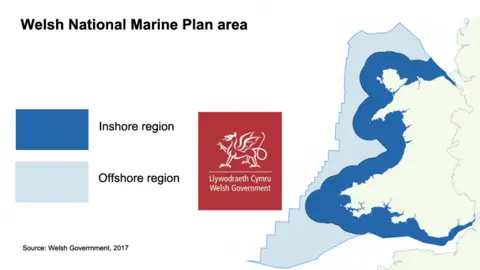Marine wildlife charities' worries over management plan
 Redders48/Getty Images
Redders48/Getty ImagesA long-awaited plan for managing Wales' seas could have "significant negative consequences" for marine wildlife, environment groups have warned.
Assembly members are set to debate the draft Welsh national marine plan on Tuesday afternoon.
It sets out how seas should be used and protected over the next 20 years.
The Welsh Government said it was aiming for "clean, healthy, safe, productive and biologically diverse seas".
Clare Reed from the Marine Conservation Society said the plan needed to do more to demonstrate how it intends to protect wildlife.
"We are concerned that the current inclusions of strategic resource areas - mapped areas for growth of marine industry - may have significant negative consequences for marine wildlife and the habitats on which they depend."
RSPB Cymru said it was "shocked" by elements of the plan, which it described as "deeply worrying".
Director Katie-Jo Luxton said some of the policies outlined in the document threatened to undo the Welsh Government's own commitments to nature and sustainable development.
 tonymapping
tonymappingSupport for a number of tidal lagoon energy schemes along the Welsh coast "with very limited caveats" was the worst example, she said.
"We are becoming increasingly worried that they are failing to apply the Wellbeing of Future Generations Act and continue to prioritise development at the expense of nature."
Alec Taylor, programme manager for marine governance at WWF UK, said the charity welcomed the efforts made.
But it had concerns about the emphasis placed on "extracting maximum economic benefit from Welsh seas, without sufficiently assessing how that will affect the resilience of our marine ecosystems."
The Welsh marine plan area consists of about 12,350 sq miles (32,000 sq km) of sea, as well as 1,300 miles (2,120km) of coastline.
The draft plan is the first of its kind in Wales and is designed to be used by those making planning decisions that could affect the coastline and seas.
Traditionally, the needs of different sectors that use the sea, such as fishing, tourism or energy generation, have been managed separately but this tries to bring them together.
It talks of balancing the need to protect a healthy and resilient marine environment while also using it to create jobs and boost the economy.
 BBC/Crown copyright
BBC/Crown copyrightWelsh seas could make "a strong contribution", it argues, to energy security and climate change emissions targets through the deployment of low-carbon power generators.
Once the plan has been adopted, Welsh ministers will have to report on the extent to which its objectives are being achieved.
A public consultation has been launched for people to give their views on the draft before it is finalised.
Cabinet secretary for energy, planning and rural affairs, Lesley Griffiths, said: "In Wales, tourism, transport, marine energy, fisheries, aquaculture, telecommunications and aggregates industries amongst many others are vitally important for our maritime economy.
"The plan supports these industries and our coastal communities, by providing an enabling framework for the sustainable use of Wales' marine resources."
